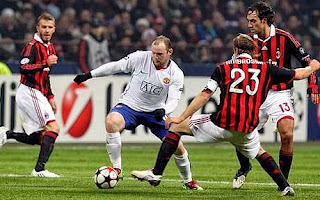First to note is that the study considered men's soccer but there is no reason to believe that it would not be true for women and youth players. Secondly, although injuries on this case refer to the physical, much of what is discussed is from a psychological and emotional perspective. There is no doubt that matches are won between the ears first, then on the pitch. This means coaches have a greater responsibility towards the psyche of their athletes that a few motivational words at half time. Confidence, faith, calm, focus- these are all matters of the mind and if mastered will be evident in how they play.
Here are some of the statements from the study which will be published soon in the British Journal of Sports Medicine later this month.
"Male football players are at a greater risk of injury five minutes after a card has been given or after a goal has been scored."
For those who have been in the game for a while, we have heard the saying that a team is most vulnerable just after scoring a goal. We have heard much less about the injury risk increasing after a card has been given. The common thread- emotional upheaval.

"One theory is that players lose their concentration following disruptive breaks in play, which then increases the risk of injury," says Jaakko Ryynänen, one of the researchers. Sadly, diving is rampant in our sport. As are other attempts to get the opposition booked. It was a positive move by new Manchester United boss David Moyes to publicly critique Ashley Young for simulation, trying to win United a penalty, even after he had been yellow carded. But sometimes, the free kicks and penalties are given. The injustice of it is unsettling both for players and managers. It is not unheard of for managers to be fined after matches for continuing to question refereeing decisions. On the field of play, however, players lose their concentration. An innocuous challenge has been deemed sinister and that player has to tread carefully the remainder of the game. For your holding midfielders who are generally involved in the meaty tackles that disturb attacks, they have to rethink their approach. Often this makes them less effective. Of course, there is the simple reaction of increased aggression to try and right the wrong by 'committing the foul I've been booked for.' Sometimes there is no aggressive reaction, but simply late or mistimed tackles simply because that natural rhythm has been disrupted by thoughts of what has just happened.

There many ways to lose a game. A second yellow. Failure to refocus quickly and conceding another goal. Loss of cohesion following injury to a player. The psychological blow when that injured player is a van Persie or a Messi. The bottom line, if you lose you head, you lose the game. Within the next few minutes actually. "Injury frequency increases within a five minute period after a yellow or red card is issued, and following injuries and goals." Remember that this is a pattern observed over the last three World Cup tournaments. While this window represents the most emotionally volatile period of play, thus being ripe for injuries, it is simultaneously the time when teams are most vulnerable to conceding. This last conclusion is my own but it is not too difficult to see the connection. While it may not be true in every case, pressing home the advantage presented by the momentary unraveling of the emotional and psychological fabric of the opposition could be very lucrative in terms of the score line.
Surprise Surprise
One of two surprising findings of the study is that- "The frequency of player injuries also increases when their own team is in the lead. These are the findings of researchers at the Sahlgrenska Academy. This is not all that difficult to conceive though. Being in behind forces a team to play more aggressively in search of an equalizer increasing the risk for players on the leading team.
Turning their attention to the losing team, the researchers went on to suggest that the pressure of being behind does not increase injury risk evenly among players.
"One possible cause is that the results of any one match are very important in international tournaments. This may accentuate the role of the strikers, leading to increased pressure on them," says Jaakko Ryynänen.
In essence, both winning and losing increase injury risk as a result of increased aggression.

The second and most surprising finding published in the article is that injury frequency INCREASES when there is a longer break between matches.
"It sounds contradictory that the risk of injury increases with longer recovery times, but our theory is that this may be due to players losing their focus on match games after a break of several days. Perhaps teams also play at a higher level of intensity after they have rested for a number of days and have more energy."
These serve to to show one thing- that injury is variable in its causes. After all wouldn't we expected that better rested players would be MORE focused? having had time to redirect their energies? It certainly rules out the contributions that fatigue might make, but as the researchers theorize, it means more energy, higher intensity and therefore greater risk of injury.
I believe coaches should be in the business of risk management as much as in producing results. After all, how can you win if your players are all injured? Being able to read the signs that are predictive of injury and managing them well may very well be the deciding factoring winning championships that nobody really talks about.
The article "Foul play is associated with injury incidence: An epidemiological study of three FIFA World Cups (2002-2010)" was be published in the British Journal of Sports Medicine on 15 October.
No comments:
Post a Comment
I'd love to hear your thoughts and questions! Just submit them below.